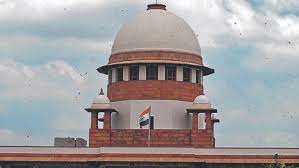Today, we have a case of the first respondent – Baleshwar Singh, who was admittedly an employee of the undivided State of Uttar Pradesh and who has been deprived of salary for a considerable long time and retiral benefits though there was no fault on his part. (Para 1)
The first respondent – Baleshwar Singh was allocated to the State of Uttarakhand (Para 2)
The first respondent – Baleshwar Singh accordingly joined duty in the State of Uttarakhand on 30th September, 2008. Then came a decision of the High Court of Uttarakhand on 26th July, 2010. As a result of the said order, the policy of the mutual transfer was set at naught. As a result of which, the first respondent – Baleshwar Singh made an application to the State of Uttarakhand to relieve him from duty. On 5th April, 2011, the State of Uttarakhand directed the first respondent – Baleshwar Singh to resume his duty in the reconstituted State (Para 3)
The net result of this situation is that the first respondent – Baleshwar Singh was relieved by the State of Uttarakhand and notwithstanding the order dated 28th May, 2012, the State of Uttar Pradesh did not allow him to resume his duty. (Para 5)
The State Government was also directed to make payment of the current salary starting from May, 2016 and the arrears of salary were ordered to be paid to the first respondent – Baleshwar Singh within three months. A direction was also issued that the first respondent – Baleshwar Singh shall be entitled to regain his seniority on the basis of his placement in the allocation order dated 30th/31st October, 2006, which had been given effect from 9th November, 2006. Even consequential benefits were also ordered to be given to the first respondent – Baleshwar Singh, without disturbing the promotion granted to the third respondent – Mahendra Pratap Singh. It is this order which is impugned in the present Appeals. We may note here that there was an interim order passed by this Court way back on 22nd August, 2016, by which a direction was issued to the State of Uttar Pradesh to release all the retiral benefits to the first respondent – Baleshwar Singh. There are interlocutory applications filed on record which make a grievance that though pensionary benefits were released, the same were released on the footing that the date of superannuation of the first respondent – Baleshwar Singh is 18th April, 2011. (Para 6)
After having carefully considered the submissions, we are constrained to note that the default is on the part of the State of Uttar Pradesh. There was a clear order passed on 28th May, 2012 directing the State of Uttar Pradesh to permit the first respondent – Baleshwar Singh to resume the duty subject to further orders which may be passed in the writ petition filed by the third respondent – Mahendra Pratap Singh. (Para 7)
Therefore, considering the aforesaid conduct of the State of Uttar Pradesh, it is impossible to find fault with the direction issued by the Allahabad High Court to the State of Uttar Pradesh to pay arrears of salary, etc. as directed therein to the first respondent – Baleshwar Singh. We may record here that the first respondent – Baleshwar Singh has suffered for no fault on his part. (Para 9)
Admittedly, the first respondent – Baleshwar Singh reached the age of superannuation on 30th June, 2016. We fail to understand why the State of Uttar Pradesh did not comply with the interim order of this Court by releasing the pensionary benefits on the footing that the first respondent – Baleshwar Singh superannuated on 30th June, 2016. In the circumstances, while dismissing the Appeals, with a view to make complete justice, we direct the State Government to release the salary and all other consequential benefits in terms of the impugned order dated 19th April, 2016 to the first respondent – Baleshwar Singh within a period of three months from today. (Para 9)
We direct the first appellant – State of Uttar Pradesh to pay costs quantified at Rs.10,000/- (Rupees Ten Thousand) to the first respondent – Baleshwar Singh within a period of three months from today. (Para 10)
SUPREME COURT OF INDIA
2023 STPL(Web) 454 SC
[2023 INSC 1031]
State Of U.P. & Anr. Etc. Vs. Baleshwar Singh & Ors.
Civil Appeal No(s). 3887-3890 of 2023-Decided on 9-11-2023
https://stpllaw.in/wp-content/uploads/2023/12/2023-STPLWeb-454-SC.pdf







